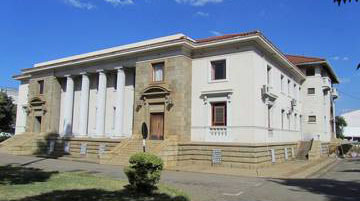
The Sunday Mail

Nokuthula Dube
Harare City Council and Hwange Local Board 2024 budget proposals have been rejected by the Government for failure to abide by guidelines meant to enhance service delivery, which were outlined by President Mnangagwa last year.
In November, the President launched a blueprint — “A Call to Action, No Compromise to Service Delivery” — which sought to guide local authorities in drafting their budgets.
The Ministry of Local Government and Public Works then engaged technocrats from local institutions of higher learning to assess whether the proposed budgets submitted by all 92 local authorities were in sync with the blueprint.
In a statement, Local Government Minister Winston Chitando said most local authorities had their budgets approved.
“Two local authorities — Hwange Local Board and Harare City Council — have had their budgets rejected outright, whilst the majority of local authorities have had budgets approved subject to a number of issues being addressed,” he said.
In the case of Harare, Minister Chitando cited the absence of a functional computer-based organisational system, overstaffing and unaudited accounts, among other anomalies.
“Harare City Council does not have a functional computer-based organisational system (Enterprise Resource Planning — ERP) and this has contributed greatly to low revenue collection.
“The Parliament of Zimbabwe and Auditor-General recommendations to reinstate the previous ERP have not been complied with,” he said.
The council has reportedly failed to procure an ERP for the past five years.
“This has contributed to low revenue collection and consequently poor service delivery.
“There is no provision in the 2024 budget to address this situation.”
The city’s budget proposal was, therefore, an inaccurate reflection of the council’s revenue generation capacity, he added.
Audit of accounts
Minister Chitando said Harare failed to provide solutions in its budget to address recurring audit disclaimers.
He said in terms of Section 49 of the Public Finance Management Act, all local authorities must be audited by May 31 annually.
“However, Harare City Council is in violation of the aforementioned provision,” he continued.
“Council is behind in audits.
“Financial statements for 2017, 2018 and 2019 received a disclaimer of opinion by the external auditor, a firm of chartered accountants.
“The disclaimer of opinion means that the external auditor did not obtain sufficient and appropriate evidence to provide a basis for an audit opinion.
“The 2024 budget presented does not indicate any meaningful steps to address this matter.”
Harare, he added, also has a huge debtors bill extending to over three years, a development that is negatively affecting its cash flow.
“Estates funds are not being managed according to the law,” he continued.
“Section 300 of the Urban Councils Act stipulates that proceeds realised from the sale of land are capital funds, which should not be used to meet operational costs.
“City of Harare is not complying with the provisions of this Act.”
Review of the city’s proposed budget also revealed serious corporate governance issues in joint venture enterprises between the council and private companies.
It was revealed that there was gross non-remittance of revenues to the council, unavailability of audited accounts, unclear commercial/profit-sharing structures and a lack of monitoring of the business interests by the council.
“The budget assessment team observed that there is serious over staffing.
“This has caused Harare City Council to compare unfavourably to regional cities in terms of the employee-resident ratio.
“Consequently, a significant portion of income is channelled to salaries and not service delivery.
“No effort has been shown in the budget to rationalise this.”
Meanwhile, the Hwange Local Board budget was rejected for failure to produce financial statements for the years 2020, 2021 and 2022, in contravention of the Public Finance Management Act.
The local board was reportedly failing to optimally use its ERP. It also did not have a clear plan for filling numerous vacant posts.
Said Minister Chitando: “The budget shows that the council is only collecting an estimated 22 percent of potential revenue, being amongst the lowest in the country.”






